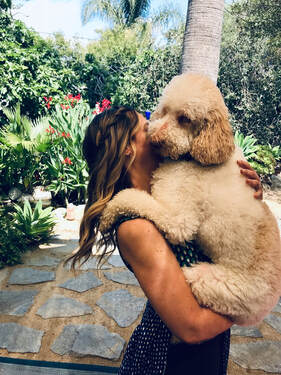|
The loss of a beloved pet can be the deepest heartbreak of our lives. With each article, we will address and answer a key topic with Certified Pet Grief Counselor, Pina De Rosa (APLB / AAVSB). If you wish to send in questions for Pina, please submit them to Pina De Rosa through www.PetBereavementCounseling.com In our last topic we looked at what are some of the factors that should be considered after a beloved pet dies, before getting another one? When it would be right or wrong to do adopt, again? How should a bereaver respond to the advice of others, regarding this? With this topic we get to look at the impact of hearing (or saying) “it was just a pet” and dealing with disenfranchised grief within the stages of grief. Disenfranchised grief is the type of grief that is not appropriately recognized, either by the bereaver’s friends, family, colleagues, society in general or anyone else around them. Disenfranchised grief can further aggravate the pain of the bereft pet owner’s who is already heartbroken. When their hear phrases like “it is/was just a pet”, it makes them feel like their pain is not validated and it makes it even harder to cope with the anguish they feel. When that unique human-pet bond is not understood, when that special devotion is not recognized by those in the life of the bereaved, it turns an already heart wrenching event into an even worse experience to endure. The bereaver ends up feeling self-conscious about their special soul-mate relationship with their beloved pet and may even become defensive. As a result, when their grief is not validated or recognized, they suffer even more because they end up spending part of their emotional energy being defensive instead of focusing on the loving memory of the deceased pet. At the very beginning of the first session, the counselor can help the heartbroken pet parent by validating their grief. By offering compassion and warm-hearted assistance, the counselor can help them cope with the anguish. By helping the bereaver understand that whey they are feeling is completely normal, that they are not going crazy, and that what they feel is to be expected, the counselor can gently help them start the healing process. It is important for the newly bereft pet owner to be made aware of and understand the stages of bereavement as it can support them in understanding that such overwhelmingly sorrowful emotions are to be expected. When a huge stable part of their daily life is abruptly ripped out, they are in a deep emotional state of shock. Often times the pet parent is not equipped to cope with their pet’s death. Even if they prepare themselves, they are rarely ready. It is helpful for them to understand that such overwhelming experience with grief and loss is something that most people experience when coping with a deep heart-wrenching loss. The length of grief is unpredictable, from a few days to a few weeks, or even longer. Understanding this, and the phases of mourning, can lessen any fear they may feel from such emotional trauma. The heartbreak they feel is so tragic, they may feel they need to endure it to no end. Understanding that the overpowering emotions they are feeling are normal can serve as a road map of the path ahead. People are often afraid of death, which can cause them to be afraid of feeling such unbearable new emotions. If they do not allow themselves to feel their true feelings, they end up causing even more psychological harm to themselves. It is beneficial to their healing process to know that the initial shock, denial and disbelief they feel are absolutely normal. And that letting out their tears is not a weakness, but a necessary part of healing. It is important to reassure them that vacillating between anger, alienation and distancing is a normal temporary response to the suffering they feel. It is often too hard for the bereft pet-owner to comprehend such loss. Letting them know that these stages are all normal during mourning, and that they are non-sequential, will help them cope with the vast scope of emotions. They may feel they are losing it, they are likely to feel guilt, and even experience some degrees of depression before they the get to a place of spiritual and emotional healing. Addressing them with understanding and compassion will help the bereaver make the journey towards that healing and resolution. What is “resolution” all about, and why do we now use this term, instead of “closure”? How can we help the grief-stricken pet parent to work toward this stage? Resolution is the final stage of bereavement. It is the time when the pet parent gets to keep the memory of their beloved companion, while being able to let go of the sharp pain and anguish they have been experiencing until now. It is when they learn to live with the pain of the loss. Resolution is the time when the pet parent is able to shift from feeling like a victim to honoring their pet’s precious brief life. Those heartwarming memories allow the bereaver to experience a new depth of love for their special companion. We now use this term instead of “closure” because, in psychology, “closure” is usually related to finding a solution to a problem. That is not a good choice when applied in reference to the loss of a dear one. The concept of “closing” is utterly intolerable to an anguished pet-owner who has just lost their special companion. When the bereft pet parent feels threatened by anything that might invalidate what they are going through, they are likely to close off and even walk away. Those are reasons why we use the term “resolution” instead of “closure”. We help them to work toward this last stage by supporting them in realizing that they can be celebrants of their special companions’ lives. We help them also by reassuring them that it is normal that they will feel some of that pain in the future - even at seemlingly random times. It is expected to tear up again even as they heal and go on with their lives. As a final note, it is also very helpful for the bereaver (and the people around them) to understand the different types of guilt they are likely to experience on their path towards resolution. Merited guilt is an emotion the pet parent will likely experience if their pet died as a result of their oversight, and carelessness - an accidental death that was not vicious in intent. Unmerited guilt is what they will likely experience when their anger is directed inward. With either merited and unmerited guilt, the bereft pet owner’s initial response is similar. They feel they are drowning in relentless self-blame and misery. Both types of guilt are damaging to the human mind and heart. Merited guilt can occur as warranted, while unmerited guilt is quite often undeserved. Both types of guilt should be dealt with in a constructive way. Like disenfranchised grief, guilt can affect a bereft pet owner healing process by deepening their sorrow, and damaging them even more. Emotions often overrule logic during the earlier stages of grief. Guilt is a complex emotion that is often invented. While some amount of self-recrimination is normal during mourning, unmerited guilt is often undeserved. What supports the bereft pet owner to shift from such unremitting self-blame during this intensely sensitive time is a supportive counselor who will guide them towards compassion and self-forgiveness coming from within.
0 Comments
Leave a Reply. |
A blog for conscious pet parents: Archives |



 RSS Feed
RSS Feed
